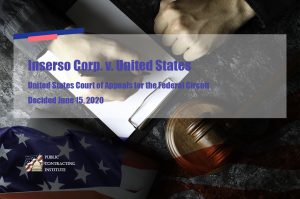PCI is starting a new webinar series, the Case of the Month Club. Each month PCI’s Government Contracts law experts will discuss one or two recent cases. The July case is Inserso Corp. v. United States. If you want to learn more about the Case of the Month Club, click here.

Inserso Corp. v. United States
United States Court of Appeals for the Federal Circuit
Decided June 15, 2020
Facts: The Defense Information Systems Agency (DISA) was running an IDIQ procurement for IT services. The solicitation was divided into two simultaneous competitions; there was a “full and open” competition, and a competition reserved for small businesses. Small businesses (and JVs and partnerships) could compete in both competitions but could only be awarded one contract. As a result, several businesses competed in both competitions. Plaintiff Inserso only competed in the small business competition. DISA did not award the contracts at the same time; instead, they finished the full and open competition long before receiving final proposal revisions on the small business competition. DISA provided debriefings to the disappointed offerors on the full and open competition, several of whom were still competing for a small business award. During its later debriefing for the small business procurement, Inserso expressed concern that the earlier debriefings would have provided unequal information to bidders competing in the small business competition – DISA replied that all unsuccessful bidders were given similarly detailed information during their respective debriefings. Inserso first protested at the GAO but refiled the protest at the Court of Federal Claims after GAO dismissed its protest because another party was protesting the award at the Court of the Federal Claims on different grounds.
Issues: Was it proper to file this protest post-award, and if it was, did the debriefings on the full and open competition with small business competitors create an unequal access to information organizational conflict of interest (OCI) that gave those offerors an unfair competitive advantage in the small business competition?
Holding: This protest should have been raised when Inserso realized that debriefings were held with some of the small business competitors, rather than post-award.
Rationale: This case was decided on the rationale in Blue & Gold Fleet, which holds that “a party who has the opportunity to object to the terms of a government solicitation containing a patent error and fails to do so prior to the close of the bidding process waives its ability to raise the same objection subsequently in a bid protest.” Subsequent cases apply this logic to any situation where the protesting party could have challenged the solicitation prior to award.
A defect is patent if the defect could have been discovered by reasonable and customary care. Inserso should have known that debriefings were happening when the GAO dismissed a protest on the full and open award (protests cannot be filed until after any debriefings have been held), and that those debriefings should include unequal information in the form of total evaluated prices. The Court held that Inserso should have protested shortly after the full and open competition contracts were awarded, rather than wait several months until after the small business award.
Dissent: The dissent in this case argued that the Supreme Court’s decision in SCA Hygiene Products Aktiebolag undermined the waiver rule from Blue & Gold. Furthermore, the dissent argues that following Inserso, potential protestors are being asked to protest prior to the closing date for proposals issues that are not apparent from the face of the solicitation.
